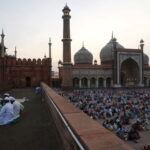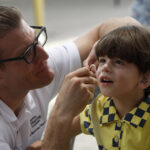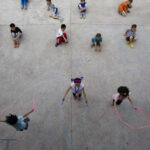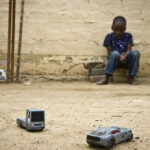Undaunted by apartheid and Aids, she has made all the difference to those otherwise abandoned.
In August the book Empty Hands: The Life of Sister Abegail Ntleko, was published. In the introduction of the self authored book, Archbishop Desmond Tutu wrote: “Hers is a remarkable tale of what it means to be fully human. It is people like Sister Abegail who usher in a better future for South Africa.”
Born into extreme poverty in KwaZulu-Natal, the 79-year-old nurse, known as Sister Abe in Underberg where she now lives, received an Unsung Heroes of Compassion award presented by the Dalai Lama in 2009. In the past two decades Ntleko has built and managed two orphanages and has helped thousands of children affected by HIV. She has also personally adopted and fostered more than 30 children.
The proceeds of her book are going to her latest project, the Kulungile Care Centre, in Underberg, where she takes care of 21 orphans.
You only started school at the age of 14 because your father didn’t believe a girl needed an education. You went to the local chief to ask his permission, which, to your surprise, worked. What was your first day at school like?
To go to school we had to wear a dress and I didn’t have one, because we were wearing traditional clothing at the time and, of course, we were too poor to afford one.
So I used to work and help out at the Sunday school and the missionary then gave me the most beautiful dress – light blue with frills around the waist. Then I was so excited to finally go to school.
On that first day in grade one, the teacher asked what we wanted to be when we grew up and, when I said “a nurse”, all the other six- and seven-year-olds started laughing at me. Even the teacher laughed. But I didn’t let that get me down.
I wore that same dress every day until grade four.
Then I left school, because I was 18, and got a job so that I could afford to buy a new uniform. I carried on like that – working one year then going to school for about three years – until I finally finished, at the age of 31.
Why did you choose nursing?
In our area there was a belief that nurses used a certain kind of injection to kill people. I was keen to become a nurse and know more about this injection so that I could stop people from using it and killing patients.
I discovered during my nursing training that it was Nikethamide and it was used to resuscitate patients and keep their hearts and respiration going. But often, if you give it, the patient still dies, which is why people had this belief.
Do you regret not marrying?
Not at all. I gave up on marriage because I only finished my nursing studies at the age of 35, in 1968, and all the single men were far too young for me. I wouldn’t commit chicken murder by getting married to a boy of 24! I used to say to them: You still smell of your mother’s breast milk.
You moved to Underberg in 1980 to open a clinic for that community, which included the rural population in the remote valleys near Lesotho. What were your biggest challenges?
The white community didn’t accept me at first, which made it more difficult for me to work.
There was one incident where I was attacked by a white farmer’s dogs and his wife let them bite me and my clothes until I was just in my panties, before she came and helped me. But after a while they began to accept me and even brought their own children for immunisations.
Then I had to eradicate all the disease because many of the people in the rural areas had never even seen a nurse in their lives. I fought the tuberculosis, leprosy and tetanus in these communities. Everything seemed to be getting better until Aids arrived.
You started the Underberg/Himeville Aids initiative (UHAI). What was a typical day like for you at that time?
I had adopted some kids, so I would wake up at 3am to do the washing, cook and get the children ready for school. Then I would go to my job at the clinic from 7am to 4pm.
I worked hard there because the other nurses were scared of Aids patients. I ended up being the only one taking blood. They asked: “What will happen if the patient jumps up and I’m poked by the needle?”
I said: “Why would you allow that – because you have to speak calmly to the patient to prepare them for when you take the blood.” I also used to say to them: “It’s not only HIV you can get through blood. Aren’t you scared of hepatitis B, which kills you before even three days have passed?”
Then I applied to the health department to borrow a vehicle and get permission to drive around at night (because at the time black people could not do this) and visit people in the community and talk about Aids. I spoke to anyone who would listen. I would get home at about 10pm and kiss my kids goodnight.
But, because of the UHAI, I opened testing centres and counselled patients. So I sat many nights with dying patients because, at that time, there were no antiretroviral drugs.
I also started distributing food parcels to orphans as Aids claimed more and more people. I virtually didn’t sleep anymore.
Then my own children, who I had adopted many years before, died of Aids in my hands. My son, Sthembiso, who was such a loving boy, asked me to hold his hands and sing to him. But it was hard singing with a heavy heart knowing this person is leaving.
‘Empty Hands: The Life of Sister Abegail Ntleko’, published by Storyzon LLC CA, is available from the hermitage, Dharmagiri, in Underberg. Email [email protected] or phone 033 701 2938. It is also available from Moyra Keane. Email [email protected] or phone 011 717 1488. Price R150, plus R30 for postage

Amy Green was a health reporter at Bhekisisa from 2013 until 2016.





